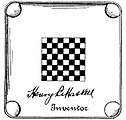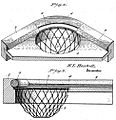Carrom Company
| Formerly | Novelty Company |
|---|---|
| Industry | games |
| Founded | 1889 |
| Founder | Henry L. Haskell |
| Headquarters | Ludington, Michigan |
Area served | United States |
| Products | Games, furniture |
| Brands | Carrom |
| Services | manufacturer |
Carrom Company (also Carrom Industries) was a manufacturer of games and furniture, headquartered in Ludington, Michigan. It started as Ludington Novelty Company in the 19th century. Its main product was the game of carroms. The company first started as the Ludington Novelty company at the end of the nineteenth century making novelty items. One of these was the game of carroms as a family game. The first carrom game boards were made by hand one by one and sold first before another was made. The game was sold in the US by the tens-of-thousands starting at the end of the 19th century. The parlor game became popular worldwide. Various local businessmen were involved with the company in its financing and management. Additional products were added to the original game of carroms as time went on, usually as associated furniture. The original company sold out to a larger firm in 1951 and the Ludington branch, which continued making the carroms game, became a small part of the larger firm.
Beginnings (1889–1900)[]

Henry L. Haskell started the Ludington Novelty company in 1889, making baskets and games. The names of the first games of "Novelty" are unknown. Haskell was a Sunday school teacher at the time and was concerned that young boys were loitering around pool halls, exposing them to develop bad habits.[1] In 1892, he invented a game called carroms that the whole family could play[2] on a carrom board, a design he later patented.[1] An 1895 newspaper advertisement said, "you can keep the boys home nights by giving them a good carrom game."[3]
The first carrom game boards were made by hand in 1892. At that time a game board was made and then sold before another was started. Haskell convinced his friend John A. Mitchell to invest in this venture in 1893. Mitchell invested $1000 in Haskell's enterprise, his brother Chauncey also invested, and the Ludington Novelty company was founded. In 1893, the company's production was about ten game boards per day; approximately 2,500 were produced in the first year. They were made by hand with the assistance of crude machinery from a Ludington planing mill partly owned by Haskell. Haskell's carroms game was marketed from Ludington and by 1901 had been introduced to ten states by their traveling salesman Eugene C. Allen.[4]
Haskell patented the carom game board (USD27788S) on October 26, 1897. His invention became popular in the US, then spread globally. An 1898 advertisement for the game of carroms in a Ludington journal used the slogan "A little nonsense now and then is relished by the wisest men." The ad went on to say that a fascinating way of nonsense was through the best parlor game made – carroms. Catalogs of carroms products were available upon request.[5]
History[]

Justus Smith Stearns, a local businessman, bought part of the company in 1900 and took over its management. The company prospered under his leadership. Other products were added to the game line, like the carrom folding card tables and other furniture. Carrom games and products were sold throughout the US by the thousands.[1]
John Mitchell was the president of Ludington Novelty Company in 1901 and his brother Chauncey E. Mitchell was treasurer. Haskell was secretary of the company at this time. Production had increased to 600 carroms games per day. The company employed 95 men, 85 women, 14 girls, and 8 boys.[6] The string pockets for the four corners of the carroms game board for collecting the ring "strikers" were made by local Ludington housewives and provided extra income for them.[7]
Ludington Novelty Company bought out the game manufacturer Archarena Company of Peoria, Illinois in 1902 and they merged. Archarena was founded by Charles C. Harper and Edgar L. Williams. Harper was a clerk for Aetna Fire Insurance Company at the time. Williams had patents on four game boards associated with Archarena. The company became the Carrom-Archarena Company and was one of the largest employers in Ludington, Michigan in the early 1900s. The Carrom-Archarena Company became Carrom Company in 1912. At this point, the game was sold in Europe and Asia. In 1916 Haskell obtained the building at 801 N. Rowe Street in Ludington. Carrom game boards were produced there.[8]

Haskell died on April 3, 1940. In 1942 the Carrom Company (also known as Carrom Industries)[9] was sold by Stearn's grandson to William Ross of Milwaukee. Ross sold the company in 1950 to Lee Smith. Carrom Company was bought out by Shampaine Industries in 1951.[10] Shampaine was headquartered in St. Louis and made furniture for institutions. Carrom's division in Ludington became a fractional part of their total business. By 1952, the total sales of carroms game boards over the first 63 years of production was estimated at over $4 million.[1] The journal Wood Working Digest estimated 5 million boards had been sold by 1958.[11]
Lee Smith retired from the company in 1960. In April 1961 three key company employees – William J. Mueckler, Robert Erickson, and Albert Del Zoppo – resigned and started their own company to market games. The first letters of their last names formed their company name, Merdel Game Manufacturing Company. Merdel manufactured their own version of the well-known game. It was sold under the name "carom" (single "r"). Shampaine filed a lawsuit against Merdel in 1961 for copyright infringement, as the original game was carroms with double "rr"s. [12] This lawsuit was ultimately dropped and dismissed on February 28, 1967.[13]
Affiliated Hospital Products Inc. acquired Shampaine in mid-1967, including Carrom Games with the registered trademark of "carrom" with the double "rr" in the name. The company became one part of Affiliated's seven divisions.[2] Affiliated made mostly furniture for hospitals. The Carrom Games division, a fraction of their total sales, moved production of their toys and games to Red Lion, Pennsylvania, for a short time in 1968. They continued to make the game of carroms and competed against Merdel's "carom" game.[10]
There was a lawsuit filed against Montgomery Ward & Company in 1969 by Affiliated, owner of the original carroms game. The lawsuit alleged that Montgomery Ward's Christmas catalog and newspaper ads misrepresented the carrom name by marketing a similar product made by Merdel with the name "carom" with one "r" to mislead the public. The lawsuit claimed that Montgomery Ward salespeople were representing to the public that what they were buying was the genuine original game of carroms, which was not correct. Their stores were, in fact, selling the copied reproduction of the game that was being produced by Merdel and sold for a lower price than the original game from Carrom Company.[10][12]
The carroms games branch of Affiliated moved to Sardis, Michigan, in 1972 and shut down later that year. This branch was sold to Merdel of Ludington. Merdel then began marketing the game with double "rr's" in the name since they now owned all rights to the trade name. By the 1980s the carrom game was selling between 80,000 and 100,000 game boards annually through toy and department stores.[8]
Merdel was acquired in 1981 by The Lightning Group of Duncannon, Pennsylvania. Merdel bought game manufacturer William F. Drueke & Sons Company of Grand Rapids, Michigan, in 1992 for just under a half-million dollars.[14] Drueke was attractive to Merdel because they manufactured parts and boards to family-oriented games like backgammon, checkers, cribbage and chess.[14] At one time in the 20th century Drueke was the only domestic manufacturer of chess sets; in the 21st century it was in financial difficulty and nearly went out of business.[14] Drueke with its employees and equipment were merged into the games division of Merdel after it was acquired and moved its manufacturing operations from Grand Rapids to Ludington.[14]
Merdel changed back the Carrom Games division to the original name of Carrom Company in 1994.[15] In 1996 Carrom bought what remained of the bankrupt Recreational Products Company. It moved its production of their air hockey game, pool tables and other works to Ludington. That part created the Carrom Sports branch division of Carrom Company.[16]
Associated patents[]

Game board, 1897[17]

Back stop board, 1900[18]

Corner-pocket, 1900[19]

Cue shooter, 1901[20]

Game-piece rings, 1902[21]
References[]
- ^ a b c d Williams, Leonard P. (December 22, 1952). "Carrom Industries / from Lumber to Game Boards". Daily News. Ludington, Michigan – via Newspapers.com
 .
. The story is told that, in the last quarter of the 19th century, when Haskell was teaching a Sunday school class of boys in a local church, he noted the tendency of boys to loiter in pool halls. His game of carroms is supposed to have been developed to provide wholesome entertainment for young people in their homes.
- ^ a b "Carrom Company Is Diversified". Daily News. Ludington, Michigan. September 3, 1965. p. 13 – via Newspapers.com
 .
.
- ^ Petersen, Dave (December 10, 1953). "Special Edition of Old Paper Given to Museum". Daily News (p. 12 – 1st column). Ludington, Michigan.
- ^ Cabot, James L. (February 27, 1990). "My Turn – Carrom source material origins". Daily News. Ludington, Michigan.
- ^ "Ludington Novelty Works". Epworth Assembly Quarterly. Epworth Association. IV (1). April 1898.
- ^ "A Home Institution". Ludington Record (p 1). Ludington, Michigan. January 17, 1901.
- ^ "What Industry Means To This Community / Carrom". Ludington Daily News – via Newspapers.com
 .
.
- ^ a b "Carrom – king in Ludington". Daily News (page 1). Ludington, Michigan. February 5, 1988 – via Newspapers.com
 .
.
- ^ "Ludington Machine and Tool". Daily News (p. 1). Ludington, Michigan. January 29, 1953 – via Newspapers.com
 .
.
- ^ a b c "Carrom / Our Story – Over 100 years in the making". Ludington Daily News. Archived from the original on 2019-01-11. Retrieved 2016-05-24.
- ^ Ward 1958, p. 61.
- ^ a b "File suit against Firm for "Carrom" Infringement". Daily News. Ludington, Michigan. December 9, 1969 – via Newspapers.com
 .
.
- ^ "Federal Court Dismisses Suit Against Firm". Daily News. Ludington, Michigan. March 3, 1967 – via Newspapers.com
 .
.
- ^ a b c d Heaney, D. Michael (July 15, 1992). "Merdel-Carrom makes Bold Move, brings Drueke games to Ludington". Daily News. Ludington, Michigan.
- ^ "Carrom Company". Daily News. 2015. Retrieved May 8, 2016.
- ^ "Best Quality Toys". Carrom History. Best Quality Toys, Muncy Valley, PA. 2015. Archived from the original on June 30, 2016. Retrieved May 24, 2016.
- ^ Haskell, H.L. (October 26, 1897), Design for a game-board, USD27788S, US Patent Office, retrieved January 19, 2018
- ^ Haskell, H.L. (July 17, 1900), Back-stop for game-boards, US654063A, US Patent Office, retrieved January 19, 2018
- ^ Haskell, H.L. (May 1, 1900), Pockets for pocket billiard tables, US648561A, US Patent Office, retrieved January 19, 2018
- ^ Haskell, H.L. (December 24, 1901), Spring-cue, US689586A, US Patent Office, retrieved January 19, 2018
- ^ Haskell, H.L. (December 29, 1900), Game-piece, US715795A, US Patent Office, retrieved January 19, 2018
Sources[]
| Wikimedia Commons has media related to Carrom Company. |
- Ward, Darrell (1958). Wood Working Digest / Keep-em playing with CARROM games. Hitchcock Publishing Company.
Coordinates: 43°56′57.0″N 86°26′42.5″W / 43.949167°N 86.445139°W
- History of Michigan
- Economy of Michigan
- Michigan culture
- Science and technology in Michigan
- Buildings and structures in Michigan
- Carrom






